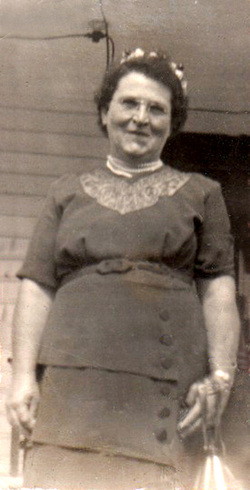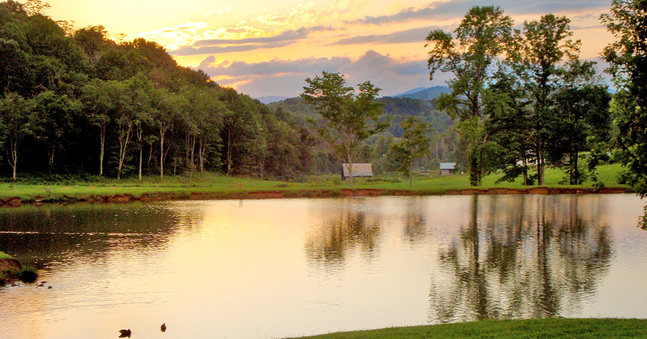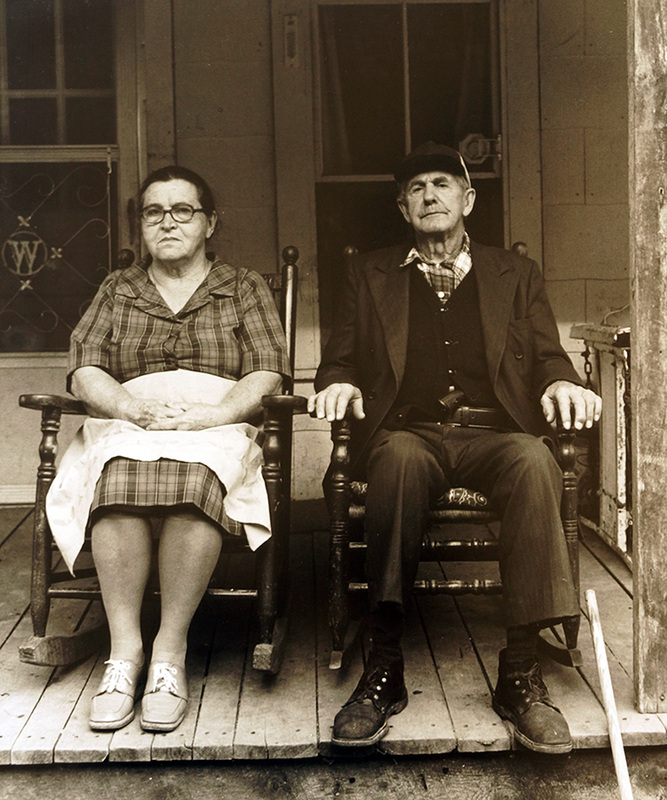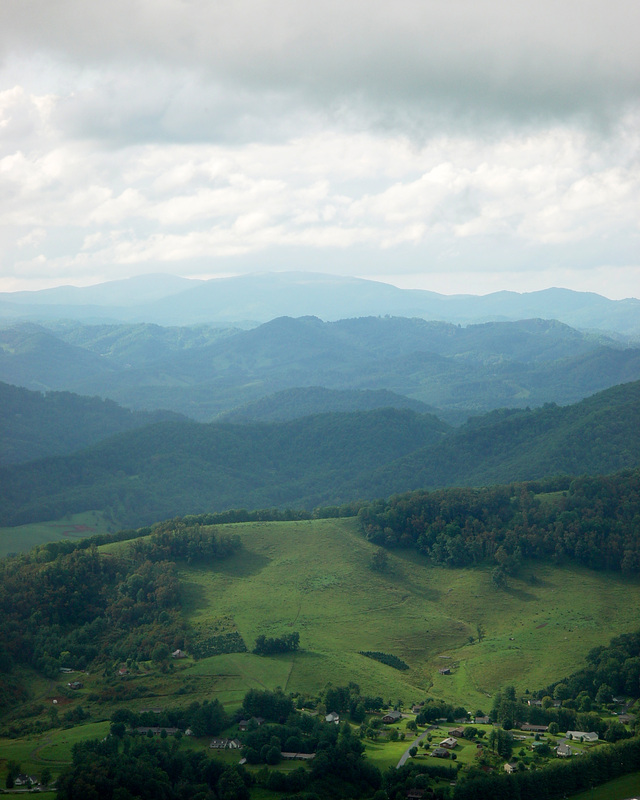Blue Ridge Portrait in the Bay
|
|
A large photograph of a grim, elderly couple takes up a considerable amount of wall space in our home’s hallway. The camera that imprinted the original negative must have been a fine one, a Hasselblad perhaps. Only a quality lens like that could have captured the hundreds of tiny lines etched in the faces of that stern pair of farmers. Each fine crease seems to mark some nameless hardship endured.
|
Coast Lines
|
The couple facing the camera sits side by side in rockers. Neither smiles. An apron tied around her waist protects the woman’s plaid house-dress. The man wears a dark coat. It’s not the sort of Sunday jacket that poor folks keep for weddings and funerals, but the kind of rough coat worn to milk the cows in the further barn when the weather is chill. It’s unbuttoned and frames the butt of a no-nonsense revolver tucked into the man’s belt.
If you were lost in the deep mountain coves of the Blue Ridge and from a distance, spotted these people on the porch of their rustic home, you might pull into their driveway to ask directions. Once you were close enough to see their expressions though, you’d probably jam the car in reverse without rolling down your window. You’d ease back out to the narrow twisted road, waving at them in the hopes that you were coming across as an accidental passerby instead of an intentional trespasser. Still, you wouldn’t breathe easy until you were out of possible pistol range.
The photograph makes some visitors to our home uncomfortable, ready to back out of our hallway. While the other pieces of artwork in our home evoke questions on occasion, no one’s ever asked about the stern mountain pair, despite its size or prominence. People might pause before it, but they never comment. Every so often, I’ll volunteer information. Like last fall, when friends of friends dropped in. The portrait caught their attention briefly and they were in the process of stepping away when I spoke.
“That’s my grandmother and grandfather,” I say. “They were really very sweet people.”
Courtesy forces the guests to stop and reexamine the picture. Although they don’t contradict me verbally, their eyebrows rise in disbelief. For some reason I feel a need to defend my grandparents’ congeniality.
“My aunt Fran was a professional photographer. In the 1960s, for an art exhibit, she shot a series of photographs of Ashe County, North Carolina, where she grew up. My grandparents lived there their whole lives. When she got them to pose, I think she was going for a sort of American-Gothic-Goes-Appalachia look. She asked them not to smile.” I pause a beat. “Normally, they looked pretty happy.”
The guests exchange glances and point their shoes to the door. Maybe mention of the gun will engage their interest.
“Fran got my grandfather to put the pistol in his belt too,” I offer. “Of course, they lived way back in the mountains, and he used to hunt to feed the family, so he had several guns. He never actually wore one around, though. Grandma wouldn’t have tolerated that.”
The guests aren’t sure how to react. My Barker family lineage isn’t the sort one usually brags about and they don’t understand my pride in being the descendant of these obviously poor, unsophisticated and rugged-looking people. They’re relieved when my husband calls us all into the living room for refreshments.
continued below
 My grandmother's normal expression
My grandmother's normal expression
For instance, my grandparents didn’t care about fashion. Although Grandma liked to dress up on Sundays and had a fondness for hats, their wardrobes were dated by decades. No food was “fast” since they grew most of their own. Their sense of economy was totally out of step with the outside world’s constant panting for newer and presumably better goods. The idea of great entertainment in Ashe County consisted of visiting with neighbors or heading up to the gas station on Saturday nights to hear the bluegrass players. The Beatles weren’t big in the Blue Ridge and the Rolling Stones never made it past Wilkesboro down in the foothills.
There were also the painfully boring cake visits. Each time my parents and I drove up from Charlotte to the farm, my grandmother would make pound cakes with the eggs I helped her collect from the hen house. She won lots of ribbons at fairs with that recipe, although I’ll never understand how she was able to finesse the wood fire in her stove enough to bake anything at all, much less prize-winning cakes.
Then my dad would drive us all down snaky roads that threaded through the tight hills. Steep forests grew next to plots of nearly vertical pastureland dotted with cows, ones that must have been kin to mountain goats or else they’d have just tumbled down. Daddy would maneuver the car over rutted roads to isolated coves where we’d deliver the cakes and assorted produce from the garden to my grandparents’ friends. This was a lengthy process and involved sitting on their porches or in small rooms lined with old newspapers glued to the rough plank walls in a pathetic attempt to block the winter winds. At one cabin, a tattered truck seat served as a sofa. The shell of the rusted, cannibalized vehicle was being used as a hen house in the yard.
Sometimes we’d make two or three visits in a single day. Wherever we went, I always wanted to leave before we got there. I didn’t see how desperately those people needed the vegetables and the dozen eggs that my grandmother had brought - as though they were an afterthought – to leave along with the cake. Or how those social calls left the dignity of our hosts intact and prevented sharing from becoming charity.
My grandparents managed to feed six children during the worst economic crisis in the country, living in one of the most destitute areas of the south. They understood that poverty wasn’t to be judged. One accident, one illness, one bad turn of fortune, one lost loved one could set a person back, sometimes for good.
Those who had more – wealth, land, education - weren’t entitled, they had merely been favored by luck or by birth. Envy wasted energy, because prosperity wasn’t a matter of being special or blessed. The god they worshiped loved all equally.
I was favored by luck myself - both grandparents lived long enough for me to re-appreciate them. I grew to take enormous pride in their unvarnished character and the mountain heritage that shaped our family. When I moved away to the flatlands of the Gulf Coast after college, I was drawn by the similarities in attitude, as well as the differences in landscape. People I met during my first visits to Bay St. Louis left me with the impression that I’d be accepted, no matter my economic status or my social standing. The scenery didn’t look anything like North Carolina’s, yet it still felt like home.
Both my grandparents died before the turn of the century and even Aunt Fran passed on a few years ago. After her death, my thoughtful uncle found and sent me the print of the photograph that now hangs on our wall. It may have landed a thousand miles from where it was taken fifty years ago, but to me, it fits right in.
Categories
All
15 Minutes
Across The Bridge
Aloha Diamondhead
Amtrak
Antiques
Architecture
Art
Arts Alive
Arts Locale
At Home In The Bay
Bay Bride
Bay Business
Bay Reads
Bay St. Louis
Beach To Bayou
Beach-to-bayou
Beautiful Things
Benefit
Big Buzz
Boats
Body+Mind+Spirit
Books
BSL Council Updates
BSL P&Z
Business
Business Buzz
Casting My Net
Civics
Coast Cuisine
Coast Lines Column
Day Tripping
Design
Diamondhead
DIY
Editors Notes
Education
Environment
Events
Fashion
Food
Friends Of The Animal Shelter
Good Neighbor
Grape Minds
Growing Up Downtown
Harbor Highlights
Health
History
Honor Roll
House And Garden
Legends And Legacies
Local Focal
Lodging
Mardi Gras
Mind+Body+Spirit
Mother Of Pearl
Murphy's Musical Notes
Music
Nature
Nature Notes
New Orleans
News
Noteworthy Women
Old Town Merchants
On The Shoofly
Parenting
Partner Spotlight
Pass Christian
Public Safety
Puppy-dog-tales
Rheta-grimsley-johnson
Science
Second Saturday
Shared History
Shared-history
Shelter-stars
Shoofly
Shore Thing Fishing Report
Sponsor Spotlight
Station-house-bsl
Talk Of The Town
The Eyes Have It
Tourism
Town Green
Town-green
Travel
Tying-the-knot
Video
Vintage-vignette
Vintage-vignette
Waveland
Weddings
Wellness
Window-shopping
Wines-and-dining
Archives
July 2024
June 2024
May 2024
April 2024
March 2024
June 2023
March 2023
February 2023
January 2023
December 2022
November 2022
October 2022
September 2022
August 2022
July 2022
June 2022
May 2022
April 2022
March 2022
February 2022
January 2022
December 2021
November 2021
October 2021
September 2021
August 2021
July 2021
June 2021
May 2021
April 2021
March 2021
February 2021
January 2021
December 2020
November 2020
October 2020
September 2020
August 2020
July 2020
June 2020
May 2020
April 2020
March 2020
February 2020
January 2020
December 2019
November 2019
October 2019
September 2019
August 2019
July 2019
June 2019
May 2019
April 2019
March 2019
February 2019
January 2019
December 2018
November 2018
October 2018
September 2018
August 2018
July 2018
June 2018
May 2018
April 2018
March 2018
February 2018
January 2018
December 2017
November 2017
October 2017
September 2017
August 2017
July 2017
June 2017
May 2017
April 2017
March 2017
February 2017
January 2017
December 2016
November 2016
October 2016
September 2016
August 2016
July 2016
June 2016
May 2016
April 2016
March 2016
February 2016
January 2016
December 2015
November 2015
October 2015
September 2015
August 2015
July 2015
June 2015
May 2015
April 2015
March 2015
February 2015
January 2015
December 2014
November 2014
August 2014
January 2014
November 2013
August 2013
June 2013
March 2013
February 2013
December 2012
October 2012
September 2012
May 2012
March 2012
February 2012
December 2011
November 2011
October 2011
September 2011
August 2011
July 2011
June 2011






























 RSS Feed
RSS Feed























